Hospitality and Tourism: Venice Over-tourism Case Study Analysis
VerifiedAdded on 2022/10/01
|11
|2147
|56
Report
AI Summary
This report examines the overtourism crisis in Venice, Italy, based on a documentary analysis. It identifies key ethical and governance issues, including the displacement of local residents, the impact of mass tourism on the city's infrastructure and environment, and the role of unlicensed tourist guides. The report discusses the responsibilities of various stakeholders, particularly the Italian government, in addressing these problems. It analyzes the government's actions and inactions, and offers recommendations for mitigating the negative effects of overtourism. These recommendations include implementing tourist taxes, limiting the number of tourists, regulating cruise ship entries, and revising tourist guide regulations. The report emphasizes the need for a collaborative approach involving the government and the local community to ensure the sustainability of Venice's tourism industry and protect its heritage.
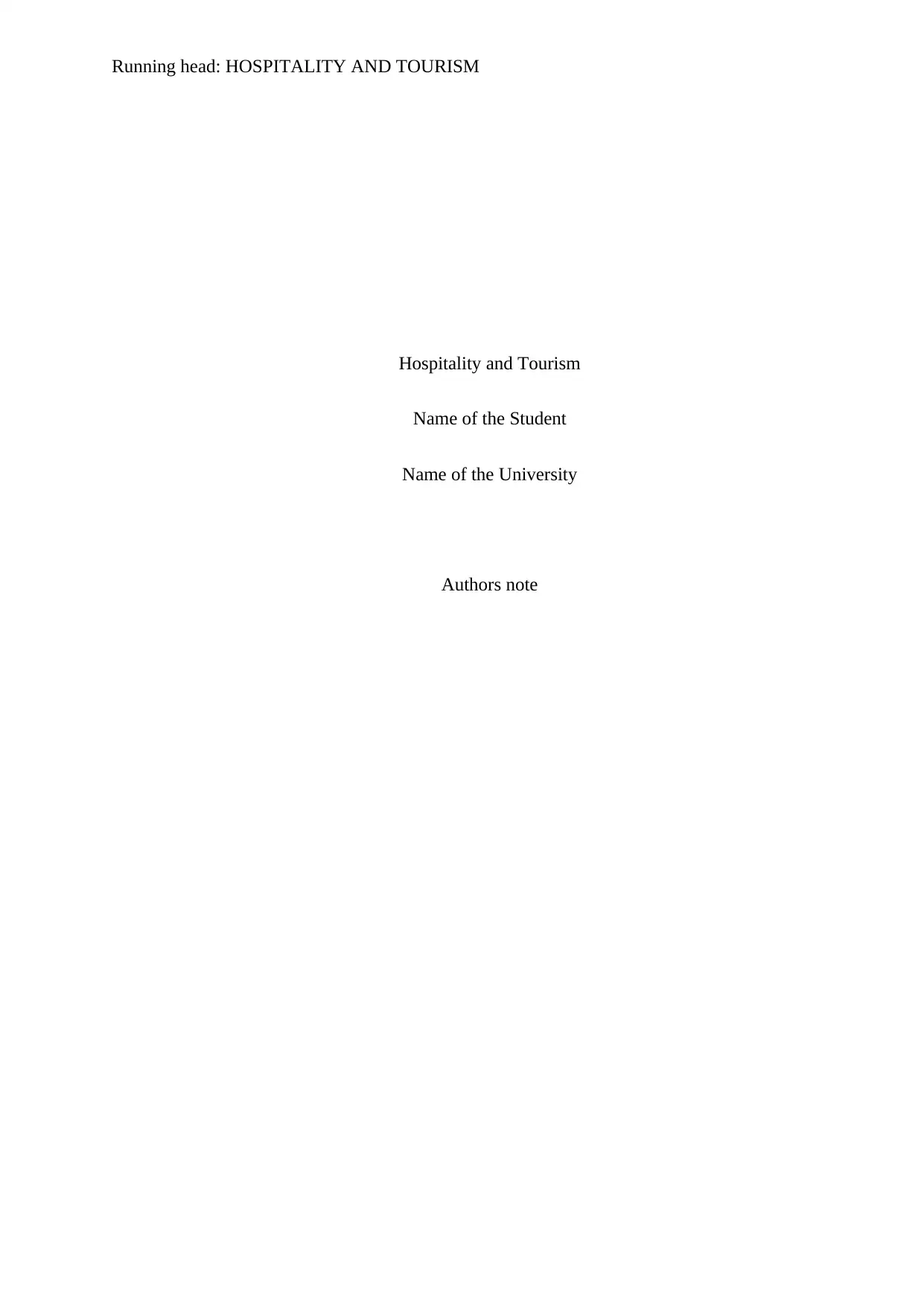
Running head: HOSPITALITY AND TOURISM
Hospitality and Tourism
Name of the Student
Name of the University
Authors note
Hospitality and Tourism
Name of the Student
Name of the University
Authors note
Paraphrase This Document
Need a fresh take? Get an instant paraphrase of this document with our AI Paraphraser
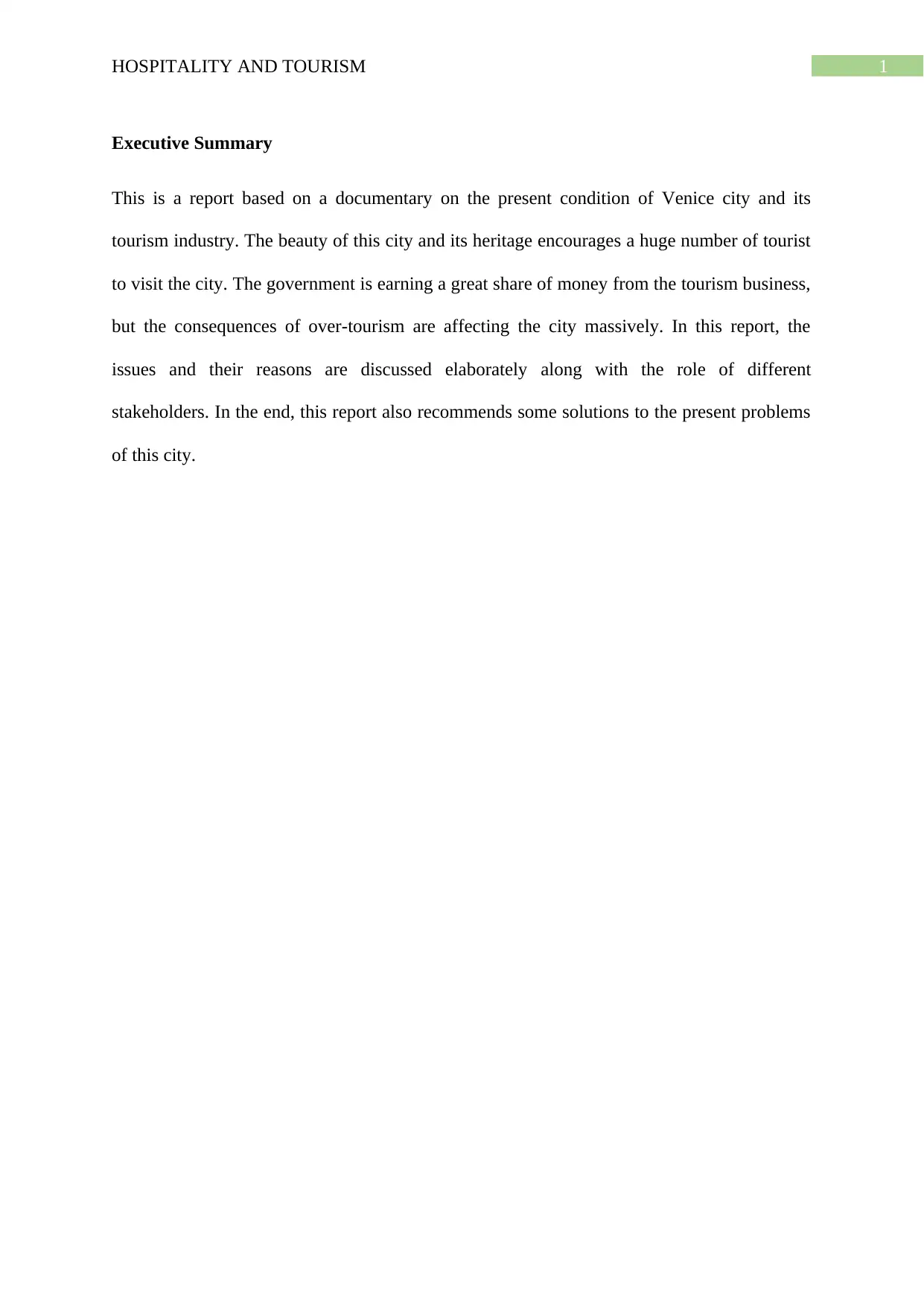
1HOSPITALITY AND TOURISM
Executive Summary
This is a report based on a documentary on the present condition of Venice city and its
tourism industry. The beauty of this city and its heritage encourages a huge number of tourist
to visit the city. The government is earning a great share of money from the tourism business,
but the consequences of over-tourism are affecting the city massively. In this report, the
issues and their reasons are discussed elaborately along with the role of different
stakeholders. In the end, this report also recommends some solutions to the present problems
of this city.
Executive Summary
This is a report based on a documentary on the present condition of Venice city and its
tourism industry. The beauty of this city and its heritage encourages a huge number of tourist
to visit the city. The government is earning a great share of money from the tourism business,
but the consequences of over-tourism are affecting the city massively. In this report, the
issues and their reasons are discussed elaborately along with the role of different
stakeholders. In the end, this report also recommends some solutions to the present problems
of this city.
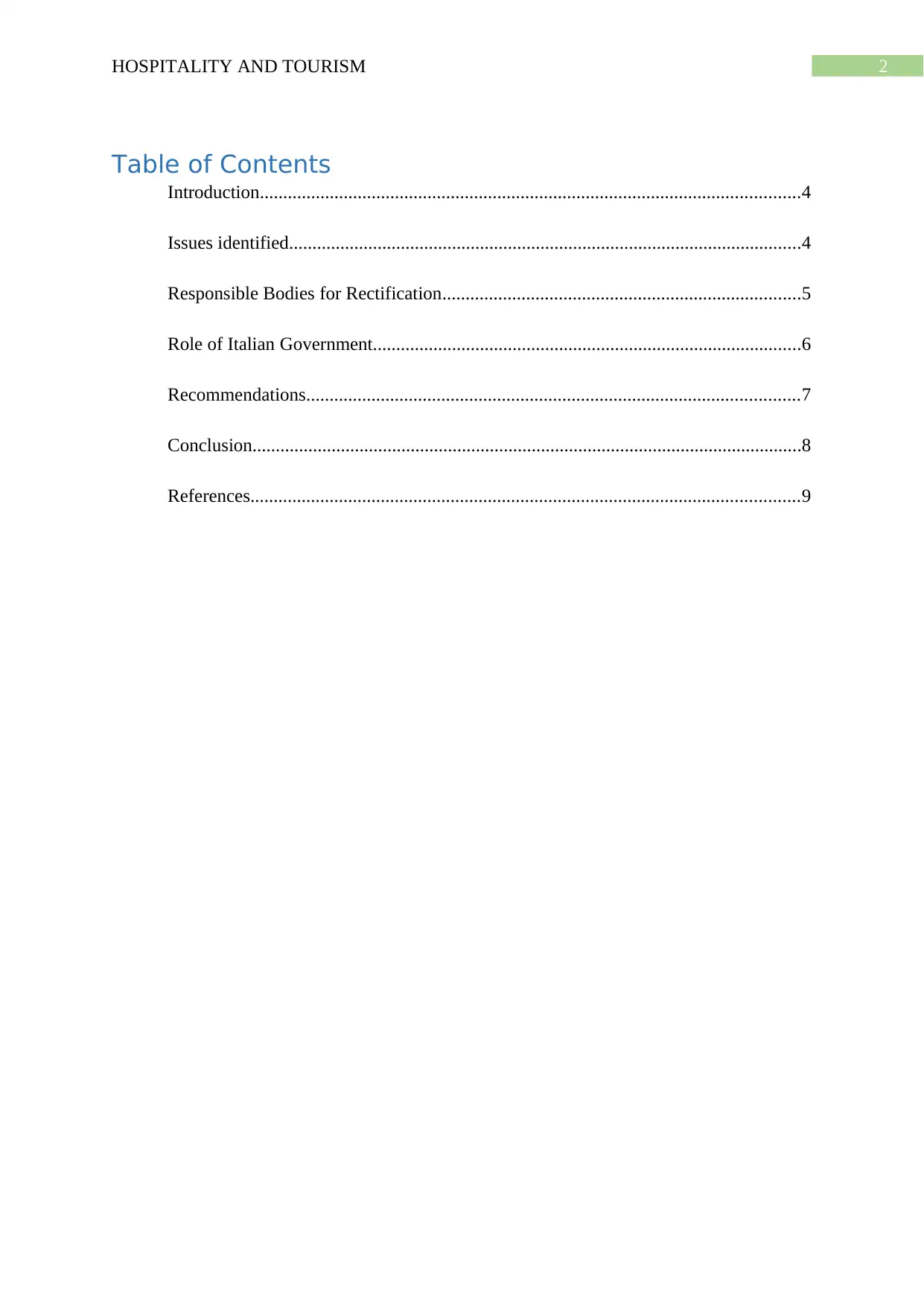
2HOSPITALITY AND TOURISM
Table of Contents
Introduction....................................................................................................................4
Issues identified..............................................................................................................4
Responsible Bodies for Rectification.............................................................................5
Role of Italian Government............................................................................................6
Recommendations..........................................................................................................7
Conclusion......................................................................................................................8
References......................................................................................................................9
Table of Contents
Introduction....................................................................................................................4
Issues identified..............................................................................................................4
Responsible Bodies for Rectification.............................................................................5
Role of Italian Government............................................................................................6
Recommendations..........................................................................................................7
Conclusion......................................................................................................................8
References......................................................................................................................9
⊘ This is a preview!⊘
Do you want full access?
Subscribe today to unlock all pages.

Trusted by 1+ million students worldwide
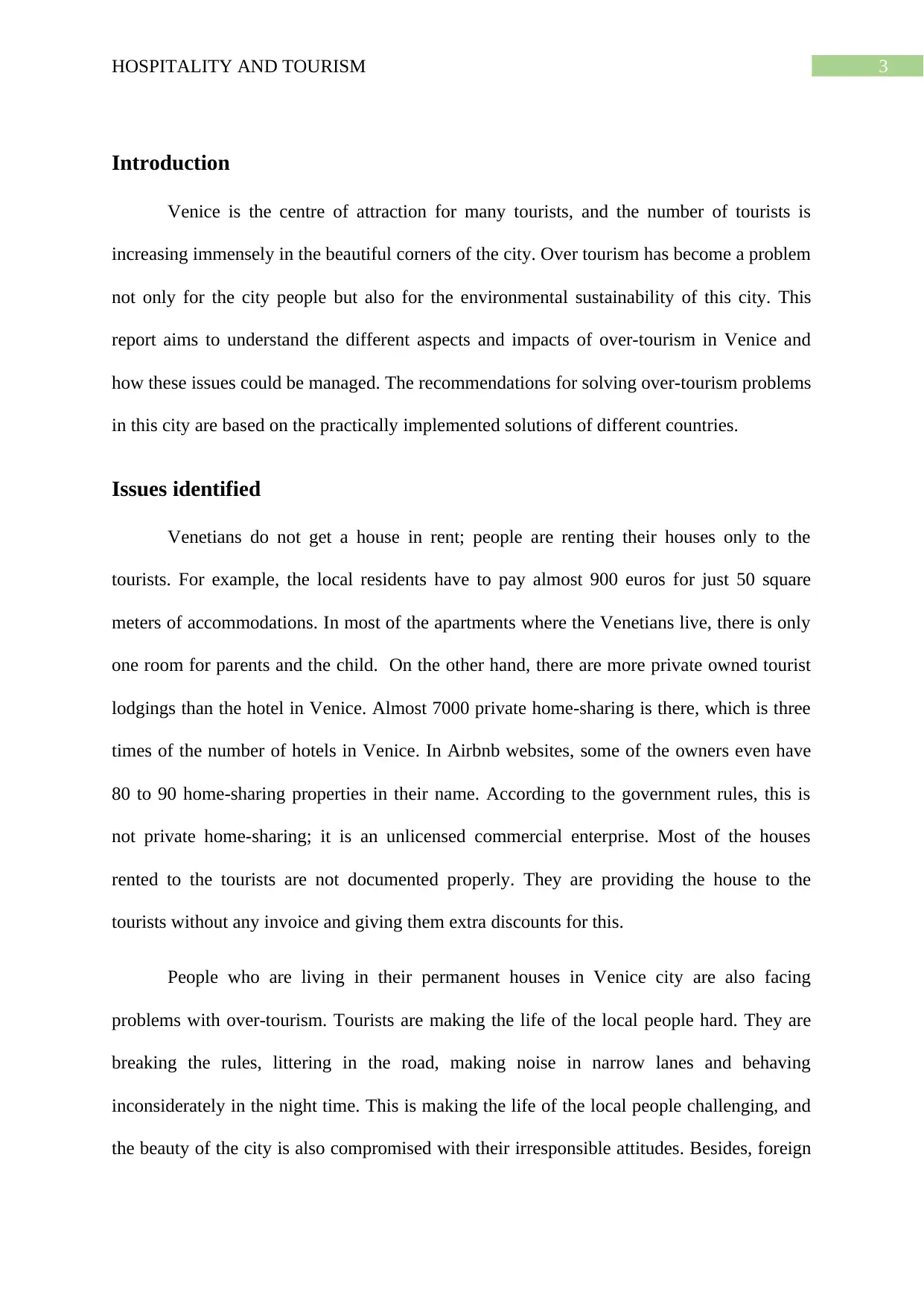
3HOSPITALITY AND TOURISM
Introduction
Venice is the centre of attraction for many tourists, and the number of tourists is
increasing immensely in the beautiful corners of the city. Over tourism has become a problem
not only for the city people but also for the environmental sustainability of this city. This
report aims to understand the different aspects and impacts of over-tourism in Venice and
how these issues could be managed. The recommendations for solving over-tourism problems
in this city are based on the practically implemented solutions of different countries.
Issues identified
Venetians do not get a house in rent; people are renting their houses only to the
tourists. For example, the local residents have to pay almost 900 euros for just 50 square
meters of accommodations. In most of the apartments where the Venetians live, there is only
one room for parents and the child. On the other hand, there are more private owned tourist
lodgings than the hotel in Venice. Almost 7000 private home-sharing is there, which is three
times of the number of hotels in Venice. In Airbnb websites, some of the owners even have
80 to 90 home-sharing properties in their name. According to the government rules, this is
not private home-sharing; it is an unlicensed commercial enterprise. Most of the houses
rented to the tourists are not documented properly. They are providing the house to the
tourists without any invoice and giving them extra discounts for this.
People who are living in their permanent houses in Venice city are also facing
problems with over-tourism. Tourists are making the life of the local people hard. They are
breaking the rules, littering in the road, making noise in narrow lanes and behaving
inconsiderately in the night time. This is making the life of the local people challenging, and
the beauty of the city is also compromised with their irresponsible attitudes. Besides, foreign
Introduction
Venice is the centre of attraction for many tourists, and the number of tourists is
increasing immensely in the beautiful corners of the city. Over tourism has become a problem
not only for the city people but also for the environmental sustainability of this city. This
report aims to understand the different aspects and impacts of over-tourism in Venice and
how these issues could be managed. The recommendations for solving over-tourism problems
in this city are based on the practically implemented solutions of different countries.
Issues identified
Venetians do not get a house in rent; people are renting their houses only to the
tourists. For example, the local residents have to pay almost 900 euros for just 50 square
meters of accommodations. In most of the apartments where the Venetians live, there is only
one room for parents and the child. On the other hand, there are more private owned tourist
lodgings than the hotel in Venice. Almost 7000 private home-sharing is there, which is three
times of the number of hotels in Venice. In Airbnb websites, some of the owners even have
80 to 90 home-sharing properties in their name. According to the government rules, this is
not private home-sharing; it is an unlicensed commercial enterprise. Most of the houses
rented to the tourists are not documented properly. They are providing the house to the
tourists without any invoice and giving them extra discounts for this.
People who are living in their permanent houses in Venice city are also facing
problems with over-tourism. Tourists are making the life of the local people hard. They are
breaking the rules, littering in the road, making noise in narrow lanes and behaving
inconsiderately in the night time. This is making the life of the local people challenging, and
the beauty of the city is also compromised with their irresponsible attitudes. Besides, foreign
Paraphrase This Document
Need a fresh take? Get an instant paraphrase of this document with our AI Paraphraser
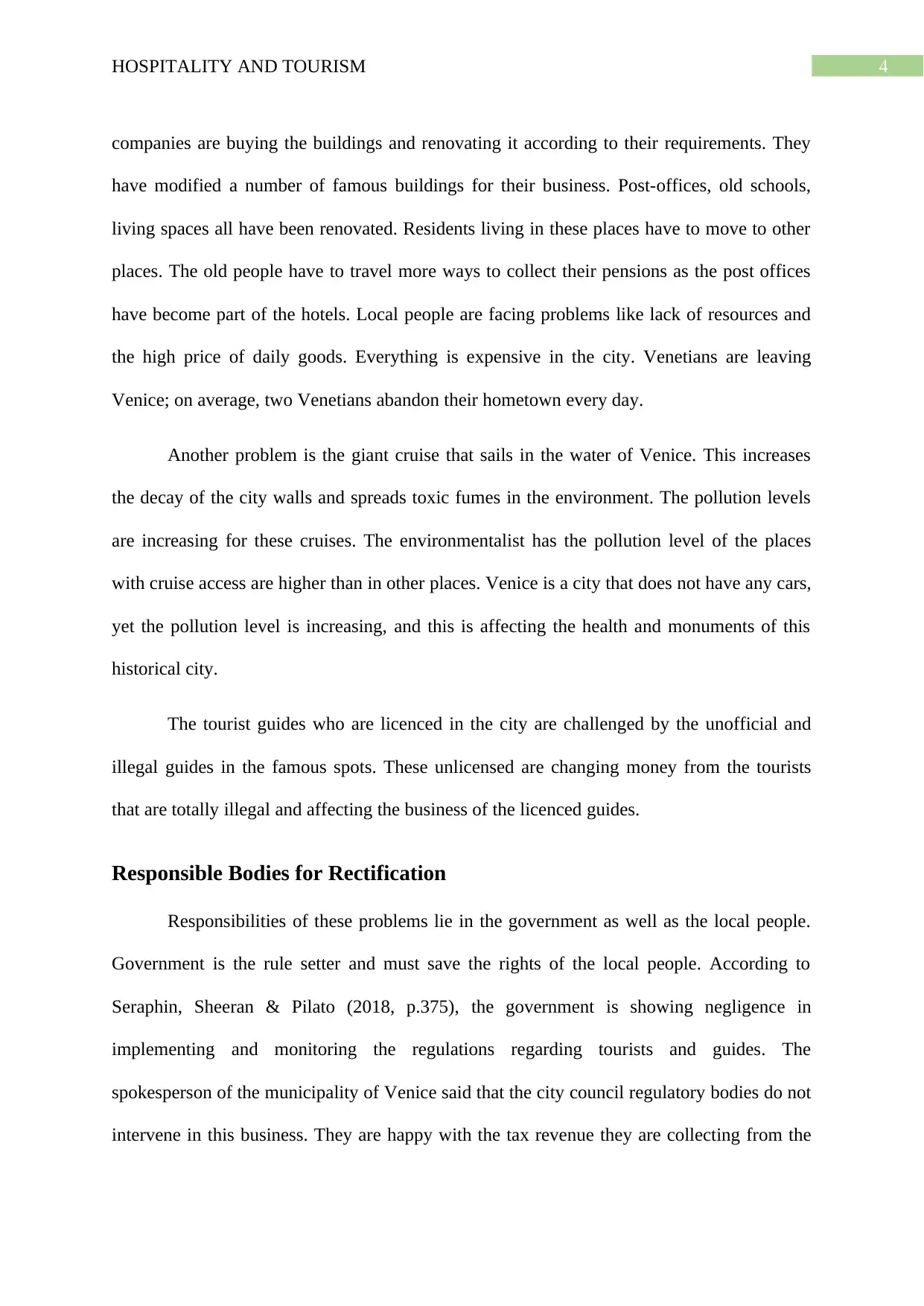
4HOSPITALITY AND TOURISM
companies are buying the buildings and renovating it according to their requirements. They
have modified a number of famous buildings for their business. Post-offices, old schools,
living spaces all have been renovated. Residents living in these places have to move to other
places. The old people have to travel more ways to collect their pensions as the post offices
have become part of the hotels. Local people are facing problems like lack of resources and
the high price of daily goods. Everything is expensive in the city. Venetians are leaving
Venice; on average, two Venetians abandon their hometown every day.
Another problem is the giant cruise that sails in the water of Venice. This increases
the decay of the city walls and spreads toxic fumes in the environment. The pollution levels
are increasing for these cruises. The environmentalist has the pollution level of the places
with cruise access are higher than in other places. Venice is a city that does not have any cars,
yet the pollution level is increasing, and this is affecting the health and monuments of this
historical city.
The tourist guides who are licenced in the city are challenged by the unofficial and
illegal guides in the famous spots. These unlicensed are changing money from the tourists
that are totally illegal and affecting the business of the licenced guides.
Responsible Bodies for Rectification
Responsibilities of these problems lie in the government as well as the local people.
Government is the rule setter and must save the rights of the local people. According to
Seraphin, Sheeran & Pilato (2018, p.375), the government is showing negligence in
implementing and monitoring the regulations regarding tourists and guides. The
spokesperson of the municipality of Venice said that the city council regulatory bodies do not
intervene in this business. They are happy with the tax revenue they are collecting from the
companies are buying the buildings and renovating it according to their requirements. They
have modified a number of famous buildings for their business. Post-offices, old schools,
living spaces all have been renovated. Residents living in these places have to move to other
places. The old people have to travel more ways to collect their pensions as the post offices
have become part of the hotels. Local people are facing problems like lack of resources and
the high price of daily goods. Everything is expensive in the city. Venetians are leaving
Venice; on average, two Venetians abandon their hometown every day.
Another problem is the giant cruise that sails in the water of Venice. This increases
the decay of the city walls and spreads toxic fumes in the environment. The pollution levels
are increasing for these cruises. The environmentalist has the pollution level of the places
with cruise access are higher than in other places. Venice is a city that does not have any cars,
yet the pollution level is increasing, and this is affecting the health and monuments of this
historical city.
The tourist guides who are licenced in the city are challenged by the unofficial and
illegal guides in the famous spots. These unlicensed are changing money from the tourists
that are totally illegal and affecting the business of the licenced guides.
Responsible Bodies for Rectification
Responsibilities of these problems lie in the government as well as the local people.
Government is the rule setter and must save the rights of the local people. According to
Seraphin, Sheeran & Pilato (2018, p.375), the government is showing negligence in
implementing and monitoring the regulations regarding tourists and guides. The
spokesperson of the municipality of Venice said that the city council regulatory bodies do not
intervene in this business. They are happy with the tax revenue they are collecting from the
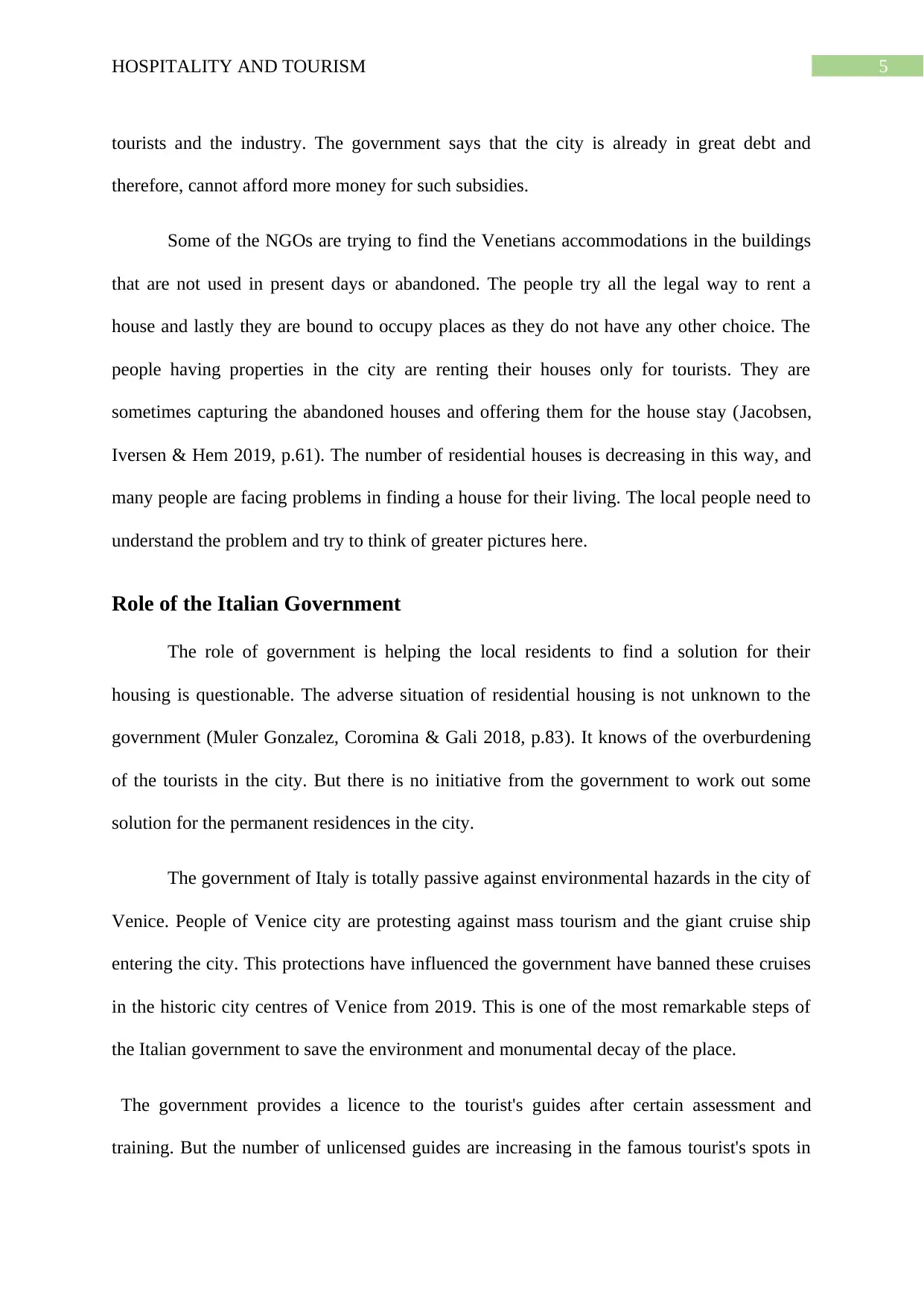
5HOSPITALITY AND TOURISM
tourists and the industry. The government says that the city is already in great debt and
therefore, cannot afford more money for such subsidies.
Some of the NGOs are trying to find the Venetians accommodations in the buildings
that are not used in present days or abandoned. The people try all the legal way to rent a
house and lastly they are bound to occupy places as they do not have any other choice. The
people having properties in the city are renting their houses only for tourists. They are
sometimes capturing the abandoned houses and offering them for the house stay (Jacobsen,
Iversen & Hem 2019, p.61). The number of residential houses is decreasing in this way, and
many people are facing problems in finding a house for their living. The local people need to
understand the problem and try to think of greater pictures here.
Role of the Italian Government
The role of government is helping the local residents to find a solution for their
housing is questionable. The adverse situation of residential housing is not unknown to the
government (Muler Gonzalez, Coromina & Gali 2018, p.83). It knows of the overburdening
of the tourists in the city. But there is no initiative from the government to work out some
solution for the permanent residences in the city.
The government of Italy is totally passive against environmental hazards in the city of
Venice. People of Venice city are protesting against mass tourism and the giant cruise ship
entering the city. This protections have influenced the government have banned these cruises
in the historic city centres of Venice from 2019. This is one of the most remarkable steps of
the Italian government to save the environment and monumental decay of the place.
The government provides a licence to the tourist's guides after certain assessment and
training. But the number of unlicensed guides are increasing in the famous tourist's spots in
tourists and the industry. The government says that the city is already in great debt and
therefore, cannot afford more money for such subsidies.
Some of the NGOs are trying to find the Venetians accommodations in the buildings
that are not used in present days or abandoned. The people try all the legal way to rent a
house and lastly they are bound to occupy places as they do not have any other choice. The
people having properties in the city are renting their houses only for tourists. They are
sometimes capturing the abandoned houses and offering them for the house stay (Jacobsen,
Iversen & Hem 2019, p.61). The number of residential houses is decreasing in this way, and
many people are facing problems in finding a house for their living. The local people need to
understand the problem and try to think of greater pictures here.
Role of the Italian Government
The role of government is helping the local residents to find a solution for their
housing is questionable. The adverse situation of residential housing is not unknown to the
government (Muler Gonzalez, Coromina & Gali 2018, p.83). It knows of the overburdening
of the tourists in the city. But there is no initiative from the government to work out some
solution for the permanent residences in the city.
The government of Italy is totally passive against environmental hazards in the city of
Venice. People of Venice city are protesting against mass tourism and the giant cruise ship
entering the city. This protections have influenced the government have banned these cruises
in the historic city centres of Venice from 2019. This is one of the most remarkable steps of
the Italian government to save the environment and monumental decay of the place.
The government provides a licence to the tourist's guides after certain assessment and
training. But the number of unlicensed guides are increasing in the famous tourist's spots in
⊘ This is a preview!⊘
Do you want full access?
Subscribe today to unlock all pages.

Trusted by 1+ million students worldwide
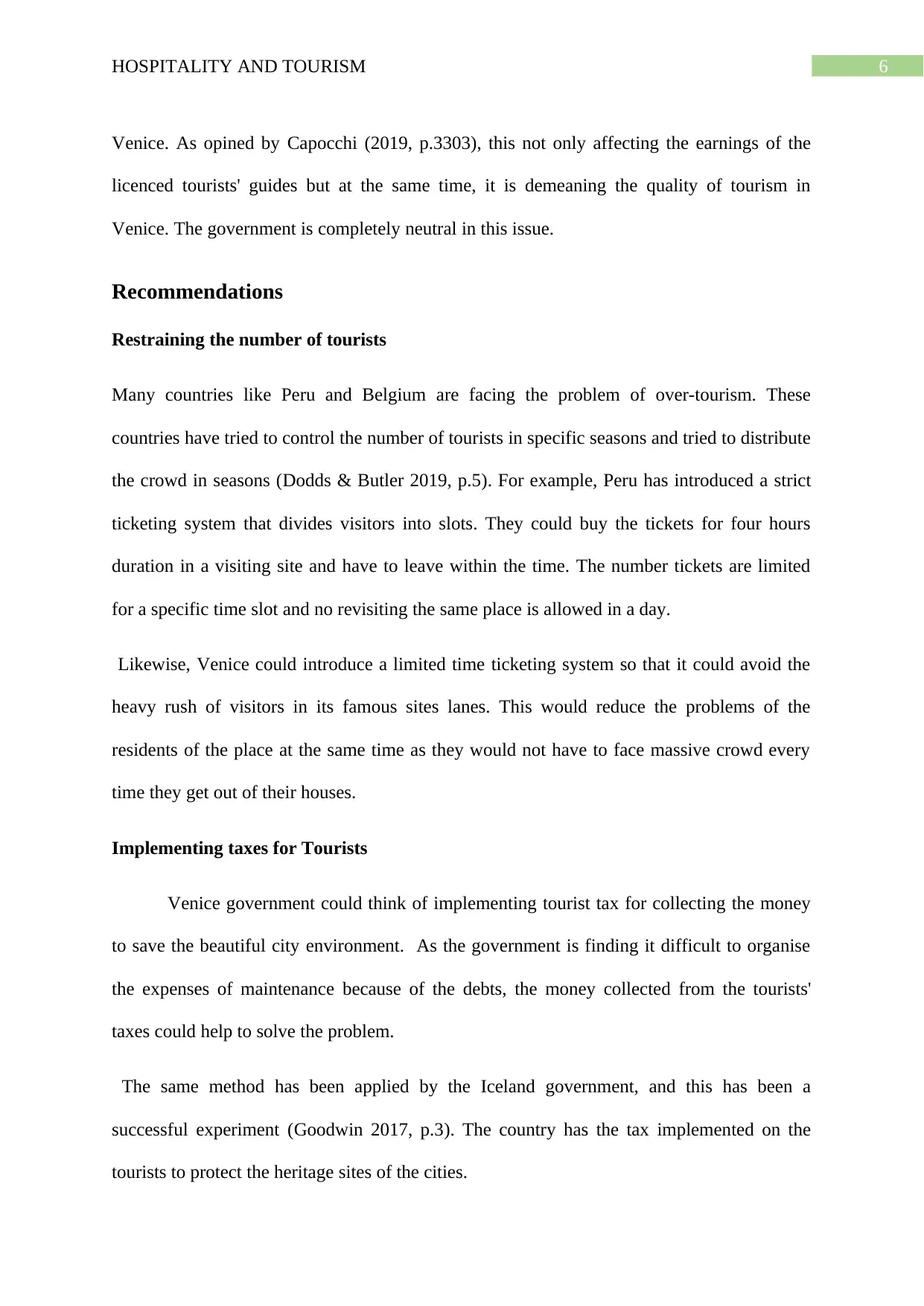
6HOSPITALITY AND TOURISM
Venice. As opined by Capocchi (2019, p.3303), this not only affecting the earnings of the
licenced tourists' guides but at the same time, it is demeaning the quality of tourism in
Venice. The government is completely neutral in this issue.
Recommendations
Restraining the number of tourists
Many countries like Peru and Belgium are facing the problem of over-tourism. These
countries have tried to control the number of tourists in specific seasons and tried to distribute
the crowd in seasons (Dodds & Butler 2019, p.5). For example, Peru has introduced a strict
ticketing system that divides visitors into slots. They could buy the tickets for four hours
duration in a visiting site and have to leave within the time. The number tickets are limited
for a specific time slot and no revisiting the same place is allowed in a day.
Likewise, Venice could introduce a limited time ticketing system so that it could avoid the
heavy rush of visitors in its famous sites lanes. This would reduce the problems of the
residents of the place at the same time as they would not have to face massive crowd every
time they get out of their houses.
Implementing taxes for Tourists
Venice government could think of implementing tourist tax for collecting the money
to save the beautiful city environment. As the government is finding it difficult to organise
the expenses of maintenance because of the debts, the money collected from the tourists'
taxes could help to solve the problem.
The same method has been applied by the Iceland government, and this has been a
successful experiment (Goodwin 2017, p.3). The country has the tax implemented on the
tourists to protect the heritage sites of the cities.
Venice. As opined by Capocchi (2019, p.3303), this not only affecting the earnings of the
licenced tourists' guides but at the same time, it is demeaning the quality of tourism in
Venice. The government is completely neutral in this issue.
Recommendations
Restraining the number of tourists
Many countries like Peru and Belgium are facing the problem of over-tourism. These
countries have tried to control the number of tourists in specific seasons and tried to distribute
the crowd in seasons (Dodds & Butler 2019, p.5). For example, Peru has introduced a strict
ticketing system that divides visitors into slots. They could buy the tickets for four hours
duration in a visiting site and have to leave within the time. The number tickets are limited
for a specific time slot and no revisiting the same place is allowed in a day.
Likewise, Venice could introduce a limited time ticketing system so that it could avoid the
heavy rush of visitors in its famous sites lanes. This would reduce the problems of the
residents of the place at the same time as they would not have to face massive crowd every
time they get out of their houses.
Implementing taxes for Tourists
Venice government could think of implementing tourist tax for collecting the money
to save the beautiful city environment. As the government is finding it difficult to organise
the expenses of maintenance because of the debts, the money collected from the tourists'
taxes could help to solve the problem.
The same method has been applied by the Iceland government, and this has been a
successful experiment (Goodwin 2017, p.3). The country has the tax implemented on the
tourists to protect the heritage sites of the cities.
Paraphrase This Document
Need a fresh take? Get an instant paraphrase of this document with our AI Paraphraser
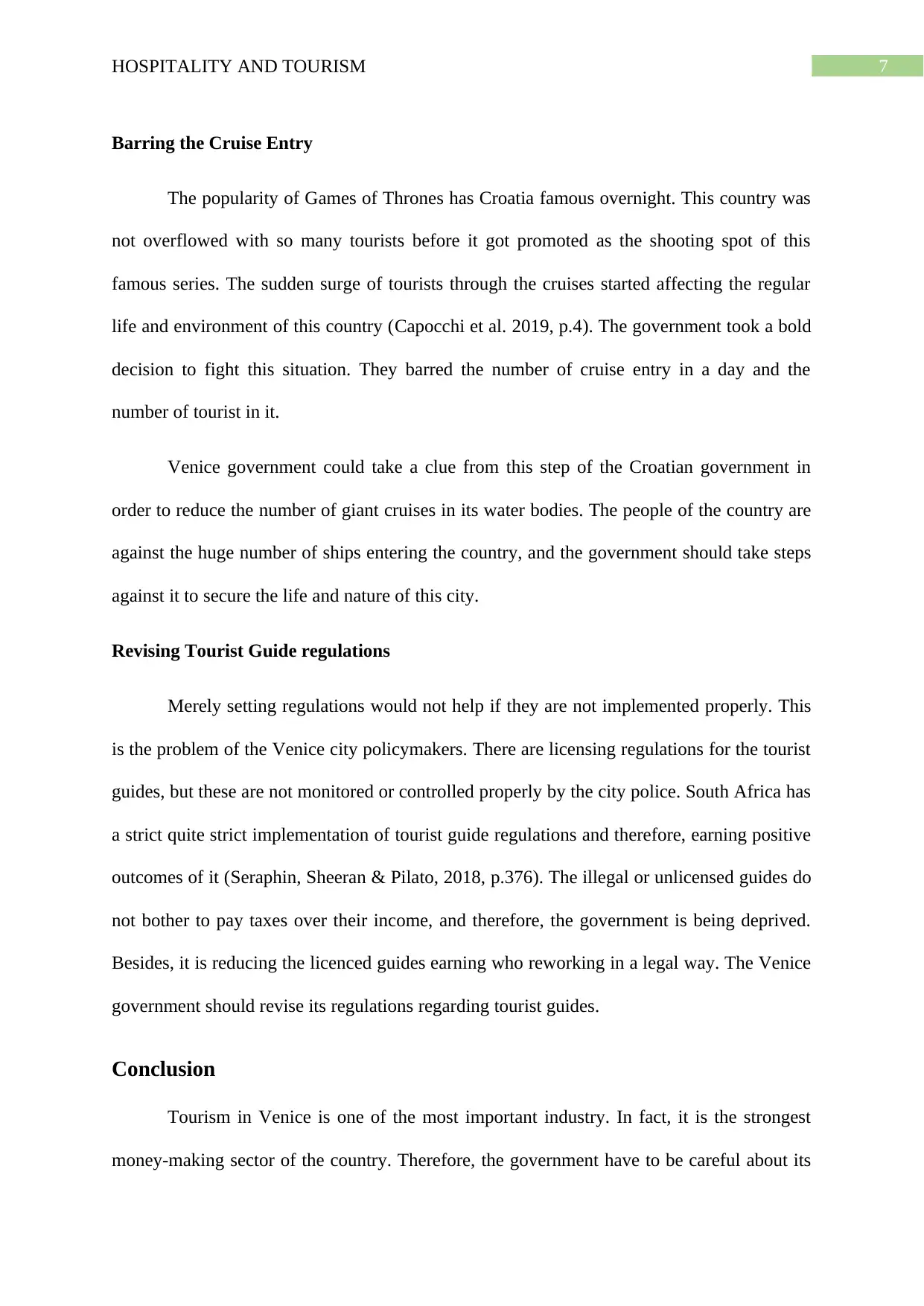
7HOSPITALITY AND TOURISM
Barring the Cruise Entry
The popularity of Games of Thrones has Croatia famous overnight. This country was
not overflowed with so many tourists before it got promoted as the shooting spot of this
famous series. The sudden surge of tourists through the cruises started affecting the regular
life and environment of this country (Capocchi et al. 2019, p.4). The government took a bold
decision to fight this situation. They barred the number of cruise entry in a day and the
number of tourist in it.
Venice government could take a clue from this step of the Croatian government in
order to reduce the number of giant cruises in its water bodies. The people of the country are
against the huge number of ships entering the country, and the government should take steps
against it to secure the life and nature of this city.
Revising Tourist Guide regulations
Merely setting regulations would not help if they are not implemented properly. This
is the problem of the Venice city policymakers. There are licensing regulations for the tourist
guides, but these are not monitored or controlled properly by the city police. South Africa has
a strict quite strict implementation of tourist guide regulations and therefore, earning positive
outcomes of it (Seraphin, Sheeran & Pilato, 2018, p.376). The illegal or unlicensed guides do
not bother to pay taxes over their income, and therefore, the government is being deprived.
Besides, it is reducing the licenced guides earning who reworking in a legal way. The Venice
government should revise its regulations regarding tourist guides.
Conclusion
Tourism in Venice is one of the most important industry. In fact, it is the strongest
money-making sector of the country. Therefore, the government have to be careful about its
Barring the Cruise Entry
The popularity of Games of Thrones has Croatia famous overnight. This country was
not overflowed with so many tourists before it got promoted as the shooting spot of this
famous series. The sudden surge of tourists through the cruises started affecting the regular
life and environment of this country (Capocchi et al. 2019, p.4). The government took a bold
decision to fight this situation. They barred the number of cruise entry in a day and the
number of tourist in it.
Venice government could take a clue from this step of the Croatian government in
order to reduce the number of giant cruises in its water bodies. The people of the country are
against the huge number of ships entering the country, and the government should take steps
against it to secure the life and nature of this city.
Revising Tourist Guide regulations
Merely setting regulations would not help if they are not implemented properly. This
is the problem of the Venice city policymakers. There are licensing regulations for the tourist
guides, but these are not monitored or controlled properly by the city police. South Africa has
a strict quite strict implementation of tourist guide regulations and therefore, earning positive
outcomes of it (Seraphin, Sheeran & Pilato, 2018, p.376). The illegal or unlicensed guides do
not bother to pay taxes over their income, and therefore, the government is being deprived.
Besides, it is reducing the licenced guides earning who reworking in a legal way. The Venice
government should revise its regulations regarding tourist guides.
Conclusion
Tourism in Venice is one of the most important industry. In fact, it is the strongest
money-making sector of the country. Therefore, the government have to be careful about its
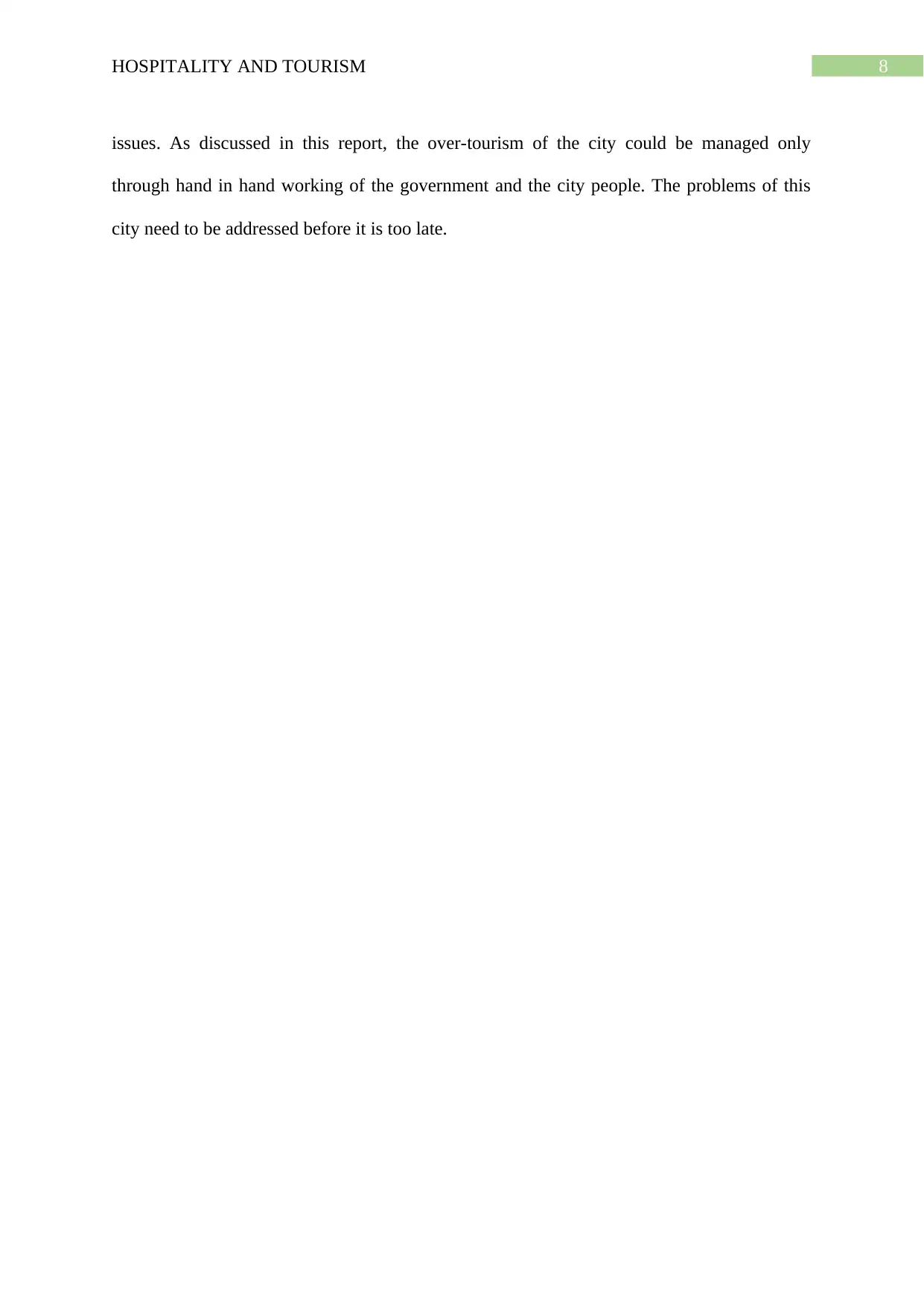
8HOSPITALITY AND TOURISM
issues. As discussed in this report, the over-tourism of the city could be managed only
through hand in hand working of the government and the city people. The problems of this
city need to be addressed before it is too late.
issues. As discussed in this report, the over-tourism of the city could be managed only
through hand in hand working of the government and the city people. The problems of this
city need to be addressed before it is too late.
⊘ This is a preview!⊘
Do you want full access?
Subscribe today to unlock all pages.

Trusted by 1+ million students worldwide
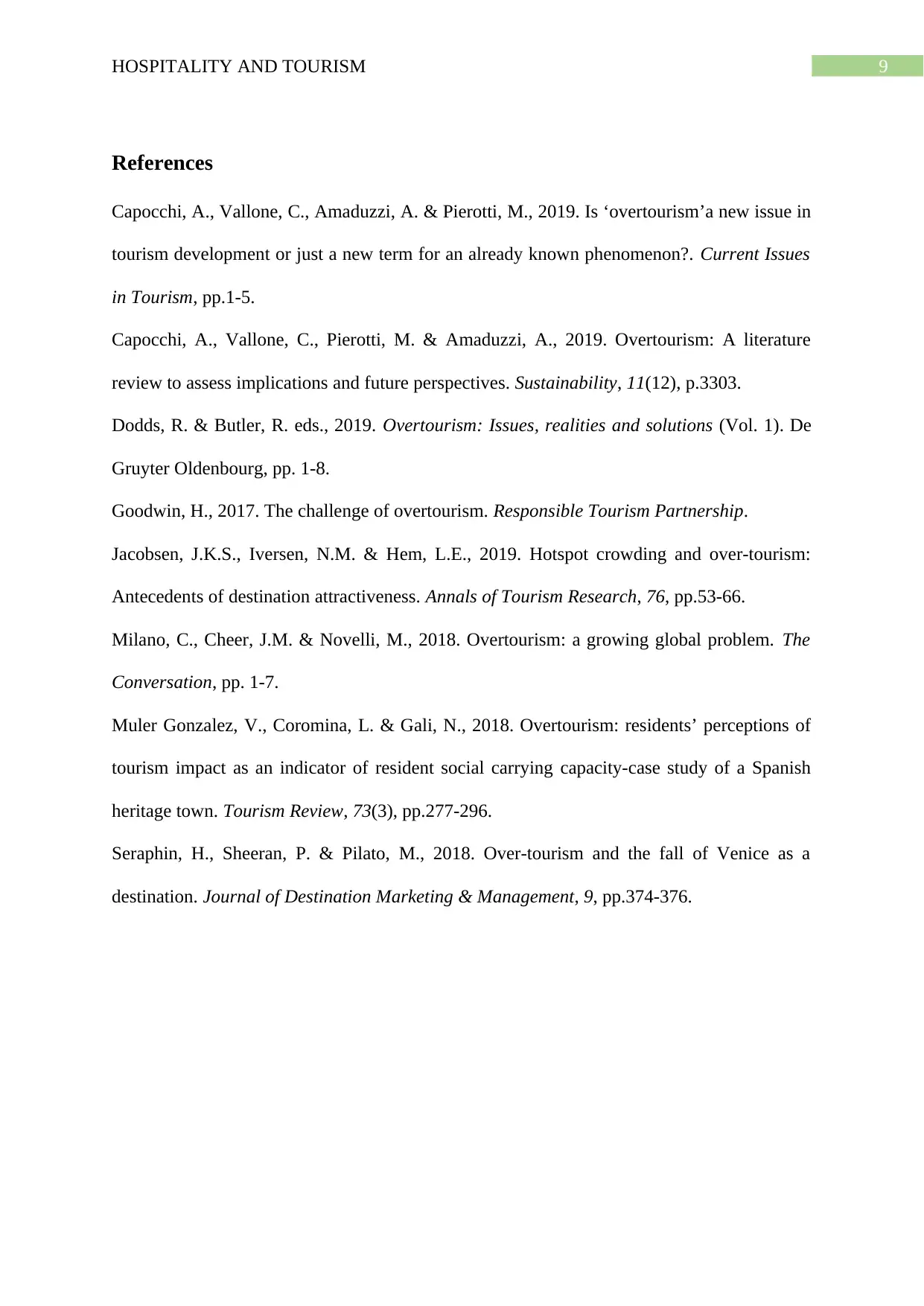
9HOSPITALITY AND TOURISM
References
Capocchi, A., Vallone, C., Amaduzzi, A. & Pierotti, M., 2019. Is ‘overtourism’a new issue in
tourism development or just a new term for an already known phenomenon?. Current Issues
in Tourism, pp.1-5.
Capocchi, A., Vallone, C., Pierotti, M. & Amaduzzi, A., 2019. Overtourism: A literature
review to assess implications and future perspectives. Sustainability, 11(12), p.3303.
Dodds, R. & Butler, R. eds., 2019. Overtourism: Issues, realities and solutions (Vol. 1). De
Gruyter Oldenbourg, pp. 1-8.
Goodwin, H., 2017. The challenge of overtourism. Responsible Tourism Partnership.
Jacobsen, J.K.S., Iversen, N.M. & Hem, L.E., 2019. Hotspot crowding and over-tourism:
Antecedents of destination attractiveness. Annals of Tourism Research, 76, pp.53-66.
Milano, C., Cheer, J.M. & Novelli, M., 2018. Overtourism: a growing global problem. The
Conversation, pp. 1-7.
Muler Gonzalez, V., Coromina, L. & Gali, N., 2018. Overtourism: residents’ perceptions of
tourism impact as an indicator of resident social carrying capacity-case study of a Spanish
heritage town. Tourism Review, 73(3), pp.277-296.
Seraphin, H., Sheeran, P. & Pilato, M., 2018. Over-tourism and the fall of Venice as a
destination. Journal of Destination Marketing & Management, 9, pp.374-376.
References
Capocchi, A., Vallone, C., Amaduzzi, A. & Pierotti, M., 2019. Is ‘overtourism’a new issue in
tourism development or just a new term for an already known phenomenon?. Current Issues
in Tourism, pp.1-5.
Capocchi, A., Vallone, C., Pierotti, M. & Amaduzzi, A., 2019. Overtourism: A literature
review to assess implications and future perspectives. Sustainability, 11(12), p.3303.
Dodds, R. & Butler, R. eds., 2019. Overtourism: Issues, realities and solutions (Vol. 1). De
Gruyter Oldenbourg, pp. 1-8.
Goodwin, H., 2017. The challenge of overtourism. Responsible Tourism Partnership.
Jacobsen, J.K.S., Iversen, N.M. & Hem, L.E., 2019. Hotspot crowding and over-tourism:
Antecedents of destination attractiveness. Annals of Tourism Research, 76, pp.53-66.
Milano, C., Cheer, J.M. & Novelli, M., 2018. Overtourism: a growing global problem. The
Conversation, pp. 1-7.
Muler Gonzalez, V., Coromina, L. & Gali, N., 2018. Overtourism: residents’ perceptions of
tourism impact as an indicator of resident social carrying capacity-case study of a Spanish
heritage town. Tourism Review, 73(3), pp.277-296.
Seraphin, H., Sheeran, P. & Pilato, M., 2018. Over-tourism and the fall of Venice as a
destination. Journal of Destination Marketing & Management, 9, pp.374-376.
Paraphrase This Document
Need a fresh take? Get an instant paraphrase of this document with our AI Paraphraser

10HOSPITALITY AND TOURISM
1 out of 11
Related Documents
Your All-in-One AI-Powered Toolkit for Academic Success.
+13062052269
info@desklib.com
Available 24*7 on WhatsApp / Email
![[object Object]](/_next/static/media/star-bottom.7253800d.svg)
Unlock your academic potential
Copyright © 2020–2025 A2Z Services. All Rights Reserved. Developed and managed by ZUCOL.





